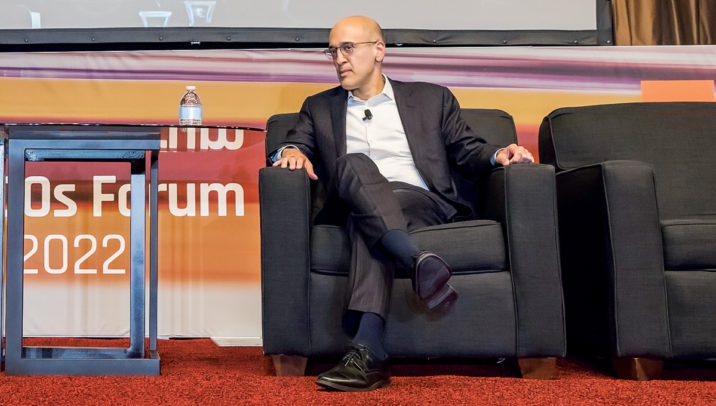
Blackstone may be a behemoth in the private funds sector, but that doesn’t mean it’s having an easy time in a talent market that has become more and more intense in the last two years.
During the 2022 CFOs & COOs Forum’s keynote interview, Vik Sawhney, who is chief administrative officer at the PE giant, said the firm is feeling the competition.
“It has never been harder to hire people. We all know that,” Sawhney pointed out. Unlike the days when young investment bankers from top universities cheerfully lined up, waiting to be tapped by a private equity firm, compromises now need to be made and new strategies adopted when it comes to hiring and retention.
“I don’t think you can compromise on integrity, culture and work ethic,” Sawhney said. “You can compromise on skill deficit because skills can be taught. But you can’t compromise on the character of the person you’re hiring.”
Echoing many managers in recent times, Sawhney said the focus now needs to be on breaking with that investment banking, Ivy League tradition, and looking for the right qualities in candidates from different schools and parts of the country outside of financial centers.
But, as the new generation of professionals begin their careers, it’s clear they also demand a break from many finance career traditions.
“Some of us who are older, like me, when we were younger, you had a job and you sucked it up, and you didn’t get feedback. And that was sort of like a badge of honor, right? Like, ‘Geez, I’m miserable, I’m working really hard. But I did it. So the next person has to do it [too],’” Sawhney said.
“But the world has really changed dramatically,” he continued. “It’s not really acceptable as a manager to say, well, that’s the way it was in 1989, and that’s how it must be forever more.
“Employees are very desirous of training, of feedback, of professional development, of being more empowered in terms of their roles on project, of having more conversations about career development… It’s important to actively address what employees want and to be in dialogue with them about their professional needs and questions.”
Sawhney said that means having both informal and formal approaches to the new generation’s needs. Mentorship programs, transparency, training – but also pulling employees into your office for a coffee to talk about their projects and personal lives, Sawhney said.
There can be a tension between that desire for training and development, on the one hand, and the seemingly ubiquitous desire of young people to work more often – if not always – from home. The vast majority of firms seem to be opting for a hybrid model for office attendance and work-from-home days. But Sawhney seemed to suggest that management need to ensure the requirements of the firm are met, particularly when it comes to investment professionals.
“Investing is an apprenticeship business,” he said. “That’s how you learn: experience.” He added that Blackstone asks investment professionals to be in the office every day, except when traveling for work.
Flexibility can apply to other roles that are less collaborative or task-oriented, Sawhney said. He still thinks coming into the office regularly is important to maintaining firm culture, training and retention, lest employees become “not bonded to your culture, to the human beings [they work with].”
But when it comes to making deals, “we have a sacred obligation to our customers – retirees, pensions, individuals – to deliver the best training to our corporate employees.”


 If you do not receive this within five minutes, please try to sign in again. If the problem persists, please email:
If you do not receive this within five minutes, please try to sign in again. If the problem persists, please email: